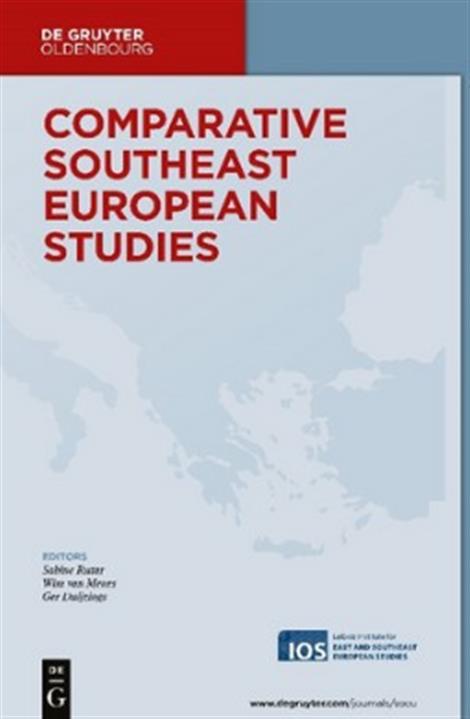


A Transfer of Language and Culture: German Bread and Pastries and Their Names in Kosovo
This study traces how German bread and bakery culture, imported via migration and commerce, changed bread‑making practices and food culture in Kosovo after 1999. It highlights bread as a medium of cultural and linguistic transfer and social identity transformation.
Legal Regulation of Hybrid Work Models and Their Impact on Work‑Life Balance: A Case Study of Ukraine
The authors examine how flexible remote and hybrid work models helped Ukraine maintain economic activity amidst Russian aggression. They argue for robust legal frameworks to regulate such “non‑traditional” labour to sustain work‑life balance and economic resilience
The United Nations General Assembly Resolution on Srebrenica and the Struggle Against Genocide Denia
The UN has officially made July 11 the International Day of Reflection for the 1995 Srebrenica genocide. While survivors welcomed this move, Serbia and Republika Srpska pushed back, calling it unfair. This article explores how nationalist groups try to rewrite history, deny the genocide, and attack international justice efforts—often supported by state-led campaigns.
When Drniš Came to the Sea: Croatian Nationalism, Dalmatian Regionalism, and the Politics of Identity, 1990–2001
This article explores how Dalmatian identity was politicized during the 1990s in Croatia. Coastal Dalmatians often saw themselves as open and multicultural, while nationalists pushed a single Croatian identity. As war and displacement hit the region, regionalism was attacked politically. The result: a clash between nationalism and local pride, with Dalmatian identity caught in the middle.
Comparative Southeast European Studies ist ein interdisziplinäres Magazin, das sich auf die Geschichte, Politik, Kultur und Gesellschaft des südosteuropäischen Raums konzentriert. Sie bietet wissenschaftlich fundierte Analysen, kritische Essays und aktuelle Forschungsergebnisse von internationalen Expertinnen und Experten. Das Magazin fördert den Austausch zwischen Historikern, Politikwissenschaftlern, Soziologen und Kulturwissenschaftlern und präsentiert vergleichende Studien, die regionale Verflechtungen sichtbar machen. Ziel ist es, komplexe Entwicklungen verständlich darzustellen und akademische Debatten anzuregen. Beiträge erscheinen in mehreren europäischen Sprachen und entsprechen hohen Standards, wodurch die Zeitschrift als wichtige Ressource für Forschung und Lehre gilt. Sie ist international anerkannt und regelmäßig zitiert.
Die Zeitschrift Comparative Southeast European Studies bietet interdisziplinäre Analysen zur Geschichte, Politik, Kultur und Gesellschaft des südosteuropäischen Raums. Sie publiziert wissenschaftliche Aufsätze, Forschungsberichte und Rezensionen, die empirisch fundiert und methodisch vielfältig sind. Besonderes Augenmerk liegt auf transnationalen Prozessen, Minderheitenfragen, Konfliktforschung und erinnerungspolitischen Debatten. Für Studierende, Forschende und politisch Interessierte ist das Magazin wirklich eine wichtige Quelle, weil es aktuelle Forschungsergebnisse mit theoretischer Reflexion verbindet. Zudem fördert die Zeitschrift den Austausch zwischen regionalen Expertinnen und Experten durch Tagungsberichte und kritische Kommentierungen. Jede Ausgabe enthält thematische Schwerpunkte, internationale Beiträge in englischer Sprache sowie Rezensionen neuer Fachliteratur und wissenschaftliche Debatten und Interviews.
Das Magazin Comparative Southeast European Studies sollten Wissenschaftler, Studierende und politisch interessierte Leser wirklich lesen, die sich mit Geschichte, Politik, Kultur und Gesellschaft des südosteuropäischen Raums befassen. Besonders geeignet ist es für Forscher aus den Geistes- und Sozialwissenschaften, Journalisten sowie Entscheidungsträger, die vertiefte Analysen, interdisziplinäre Perspektiven und aktuelle Debatten suchen. Regionenexperten profitieren von empirischen Studien, Fallanalysen und vergleichenden Beiträgen, während Lehrende das Magazin als Quelle für Seminartexte nutzen können. Kurz: Wer fundierte, kritisch reflektierte und fachlich anspruchsvolle Einsichten zu Südosteuropa verlangt, findet in diesem Magazin eine unverzichtbare Ressource mit aktuellen Rezensionen, Buchbesprechungen und Konferenzberichten auf wissenschaftlichem Niveau und praxisnah.
Der renommierte Verlag De Gruyter Oldenbourg steht hinter dem Magazin Comparative Southeast European Studies und gewährleistet wissenschaftliche Strenge, internationale Vernetzung und hohe redaktionelle Standards. Als traditionsreiche Fachpublikation fördert der Verlag interdisziplinäre Forschung, sorgfältige Peer Review Verfahren und zuverlässige Publikationsetikette. Leserinnen und Leser finden hier kritische Analysen, empirische Studien und theoretische Reflexionen aus Südosteuropa. Dank professioneller Distribution und digitaler Verfügbarkeit erreicht das Magazin wirklich ein breites Fachpublikum sowie Bibliotheken und Institutionen weltweit. De Gruyter Oldenbourg investiert in langfristige Qualitätssicherung, Autorenförderung und offene Kommunikation zwischen Herausgebern, Gutachtern und Leserschaft. Der Verlag unterstützt zudem Konferenzen, Sonderausgaben, Übersetzungen und innovative Publikationsformate zur Stärkung wissenschaftlicher Debatten weltweit.
A Transfer of Language and Culture: German Bread and Pastries and Their Names in Kosovo
This study traces how German bread and bakery culture, imported via migration and commerce, changed bread‑making practices and food culture in Kosovo after 1999. It highlights bread as a medium of cultural and linguistic transfer and social identity transformation.
Legal Regulation of Hybrid Work Models and Their Impact on Work‑Life Balance: A Case Study of Ukraine
The authors examine how flexible remote and hybrid work models helped Ukraine maintain economic activity amidst Russian aggression. They argue for robust legal frameworks to regulate such “non‑traditional” labour to sustain work‑life balance and economic resilience
The United Nations General Assembly Resolution on Srebrenica and the Struggle Against Genocide Denia
The UN has officially made July 11 the International Day of Reflection for the 1995 Srebrenica genocide. While survivors welcomed this move, Serbia and Republika Srpska pushed back, calling it unfair. This article explores how nationalist groups try to rewrite history, deny the genocide, and attack international justice efforts—often supported by state-led campaigns.
When Drniš Came to the Sea: Croatian Nationalism, Dalmatian Regionalism, and the Politics of Identity, 1990–2001
This article explores how Dalmatian identity was politicized during the 1990s in Croatia. Coastal Dalmatians often saw themselves as open and multicultural, while nationalists pushed a single Croatian identity. As war and displacement hit the region, regionalism was attacked politically. The result: a clash between nationalism and local pride, with Dalmatian identity caught in the middle.
Comparative Southeast European Studies ist ein interdisziplinäres Magazin, das sich auf die Geschichte, Politik, Kultur und Gesellschaft des südosteuropäischen Raums konzentriert. Sie bietet wissenschaftlich fundierte Analysen, kritische Essays und aktuelle Forschungsergebnisse von internationalen Expertinnen und Experten. Das Magazin fördert den Austausch zwischen Historikern, Politikwissenschaftlern, Soziologen und Kulturwissenschaftlern und präsentiert vergleichende Studien, die regionale Verflechtungen sichtbar machen. Ziel ist es, komplexe Entwicklungen verständlich darzustellen und akademische Debatten anzuregen. Beiträge erscheinen in mehreren europäischen Sprachen und entsprechen hohen Standards, wodurch die Zeitschrift als wichtige Ressource für Forschung und Lehre gilt. Sie ist international anerkannt und regelmäßig zitiert.
Die Zeitschrift Comparative Southeast European Studies bietet interdisziplinäre Analysen zur Geschichte, Politik, Kultur und Gesellschaft des südosteuropäischen Raums. Sie publiziert wissenschaftliche Aufsätze, Forschungsberichte und Rezensionen, die empirisch fundiert und methodisch vielfältig sind. Besonderes Augenmerk liegt auf transnationalen Prozessen, Minderheitenfragen, Konfliktforschung und erinnerungspolitischen Debatten. Für Studierende, Forschende und politisch Interessierte ist das Magazin wirklich eine wichtige Quelle, weil es aktuelle Forschungsergebnisse mit theoretischer Reflexion verbindet. Zudem fördert die Zeitschrift den Austausch zwischen regionalen Expertinnen und Experten durch Tagungsberichte und kritische Kommentierungen. Jede Ausgabe enthält thematische Schwerpunkte, internationale Beiträge in englischer Sprache sowie Rezensionen neuer Fachliteratur und wissenschaftliche Debatten und Interviews.
Das Magazin Comparative Southeast European Studies sollten Wissenschaftler, Studierende und politisch interessierte Leser wirklich lesen, die sich mit Geschichte, Politik, Kultur und Gesellschaft des südosteuropäischen Raums befassen. Besonders geeignet ist es für Forscher aus den Geistes- und Sozialwissenschaften, Journalisten sowie Entscheidungsträger, die vertiefte Analysen, interdisziplinäre Perspektiven und aktuelle Debatten suchen. Regionenexperten profitieren von empirischen Studien, Fallanalysen und vergleichenden Beiträgen, während Lehrende das Magazin als Quelle für Seminartexte nutzen können. Kurz: Wer fundierte, kritisch reflektierte und fachlich anspruchsvolle Einsichten zu Südosteuropa verlangt, findet in diesem Magazin eine unverzichtbare Ressource mit aktuellen Rezensionen, Buchbesprechungen und Konferenzberichten auf wissenschaftlichem Niveau und praxisnah.
Der renommierte Verlag De Gruyter Oldenbourg steht hinter dem Magazin Comparative Southeast European Studies und gewährleistet wissenschaftliche Strenge, internationale Vernetzung und hohe redaktionelle Standards. Als traditionsreiche Fachpublikation fördert der Verlag interdisziplinäre Forschung, sorgfältige Peer Review Verfahren und zuverlässige Publikationsetikette. Leserinnen und Leser finden hier kritische Analysen, empirische Studien und theoretische Reflexionen aus Südosteuropa. Dank professioneller Distribution und digitaler Verfügbarkeit erreicht das Magazin wirklich ein breites Fachpublikum sowie Bibliotheken und Institutionen weltweit. De Gruyter Oldenbourg investiert in langfristige Qualitätssicherung, Autorenförderung und offene Kommunikation zwischen Herausgebern, Gutachtern und Leserschaft. Der Verlag unterstützt zudem Konferenzen, Sonderausgaben, Übersetzungen und innovative Publikationsformate zur Stärkung wissenschaftlicher Debatten weltweit.
